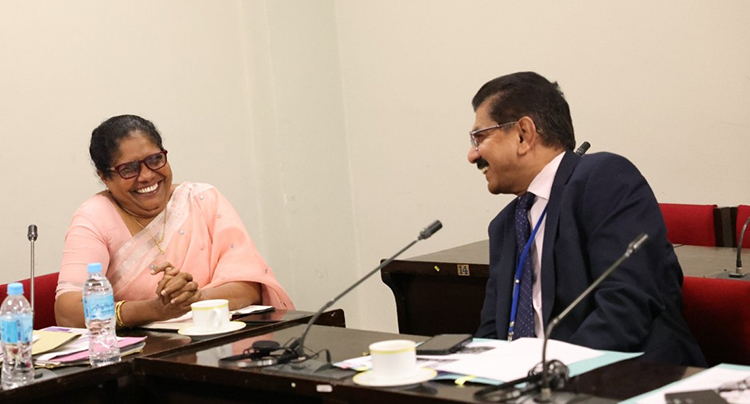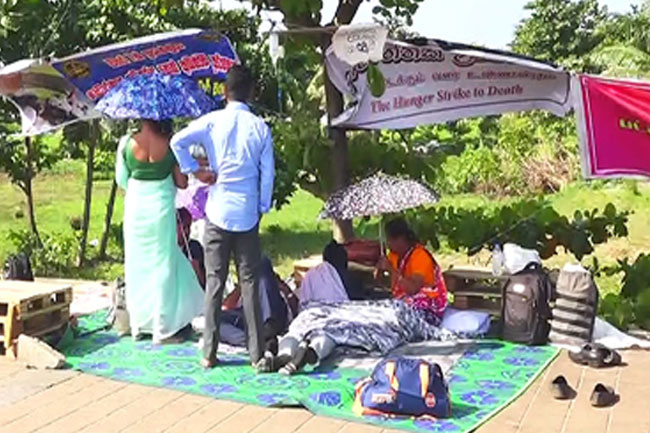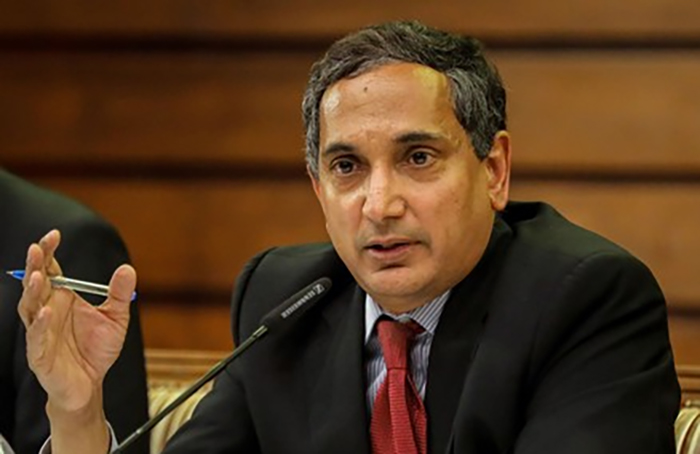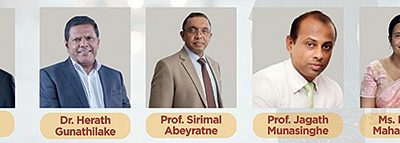News
Govt. should obtain support of SL’s natural allies in NAM and Global South who form a majority in UNHRC

While taking action to negate and disprove the charges
The United Nations Human Rights Council (UNHRC) has scheduled, at its February/March 2021 Sessions, to take up for discussion the report on Sri Lanka prepared by the High Commissioner, Mrs. Bachelet on human rights.
This is to discuss the implementation of Resolution 30/1 adopted in 2015, and the subsequent resolutions co-sponsored by the previous government on alleged past violations of human rights in Sri Lanka.
The arguments advanced by the High Commissioner are what she uses to justify the imposition of sanctions against Sri Lanka and to take it before the ICC, the International Criminal Court of Justice. There is also provision for legal action to be taken in the courts of any foreign country against individual citizens of Sri Lanka alleged to have committed crimes against humanity, (which are genocide, ethnic cleansing and war crimes).
If we are to counter these sinister moves against Sri Lanka and its citizens, then action must be taken within Sri Lanka to deprive the High Commissioner and the Western Group led by the UK (in the absence of the USA, which has left the UNHRC) of the arguments levelled by the High Commissioner to the extent that they interfere with Sri Lanka’s responsibility under the UN Charter and international human rights conventions.
Action must also be taken by the government to expose the manner in which the Report and its recommendations, should they be endorsed by the Council, will seriously undermine the Charter-based multilateral system, which is the guarantor of state sovereignty and independence established under the multilateral system based on the UN Charter.
Such action will also help to draw in its natural allies in the Global South to extend their own support to Sri Lanka within the UNHRC, and help defeat the sinister moves.
The High Commissioner’s arguments are based on the following six broad areas of concern:
* Militarization of civilian government functions.
* Reversal of Constitutional safeguards, including the passage of the 20th Amendment.
* Political obstruction of accountability for crimes and human rights violations such as the presidential commission of ‘political victimization’, which has intervened on behalf of a number of military officers implicated in gross human rights violations, including the killing of Lasantha Wickrematunga abduction of Prageeth Ekneligoda, and the naval officers implicated in ransom induced abductions and murder of Tamil youth in Trincomalee.
* Majoritarian and exclusionary rhetoric.
* Surveillance and obstruction of civil society and shrinking democratic space.
* New and exacerbated human rights concerns.
These concerns are already being addressed domestically by the people of Sri Lanka themselves, both in the past (LLRC Report) and the present. The UK-led forces backing the UNHRC resolution are well aware of this. It is important that the government should also further intensify its efforts in this direction.
In doing so, the government should fully appreciate the real motivations for these concerns by the High Commissioner. They are to advance the global agenda of the United States to maintain its hegemony and consolidate the unilateral global order that it desires.
Therefore, while taking action to negate and disprove these charges, the government should obtain the support of our natural allies in the Non-aligned Movement and the Global South, like Russia, who form a majority in the UNHRC, so as to counter what is a common threat.
Some sections of the government, including the Secretary to the Ministry of Foreign Affairs, are seeking to reach a consensus with the UK-led Western bloc. The danger of trying to reach a consensus with the US and its Western allies is that the negotiations will necessarily be between unequal partners, as a result of our high economic dependence on the very same powerful Western countries that are leading the resolution against us.
Moreover, if there are direct bilateral negotiations, then Sri Lanka’s natural allies in the Global South, which are the majority in the United Nations, will not want to get involved by supporting Sri Lanka, as shown by our own past experience.
A consensus between such unequal partners can only, therefore, result in Sri Lanka having to make compromises and also accommodate America’s global agenda, undermining Sri Lanka’s sovereignty, independence, and territorial integrity. We may be even compelled to accept the MCC, SOFA and ACSA agreements that were rejected earlier.
Under these circumstances, the option is to call for a vote in the Council through a friendly nation, such as Cuba, and to work towards obtaining the support of the Council’s majority, who are members of the Non Aligned Movement, and the Global South, including Russia. This option has already proven to be successful in numerous cases where draft resolutions against individual countries by the Western Group have been defeated.
For example, in the specific case of Sri Lanka, in September 2011, we even succeeded, with the support of the Non Aligned Movement and Russia to force the US and Canada to withdraw a draft resolution against Sri Lanka, even before it was tabled.
The support of most, if not all, Non-aligned countries and others like Russia is a certainty provided they are all made aware of the hidden agenda motivating the USA/UK led Western action against Sri Lanka, as well as the precedent that such a resolution would create in the future for the Global South as a whole.
Even if the matter is brought before the Security Council, which alone can take punitive action against a member state, and even then only when there is a threat to international peace and security or a war of aggression, both Russia and China can, and I am sure will, be able to use their veto in our defense.
In the circumstances, Sri Lanka must under no circumstances try to reach a consensus that will necessarily require compromising the multilateral principles of the UN system. If it acts on its own, it will get the necessary support of the Non-aligned countries and the Global South as it is acting on a matter of common concern for a vast majority of the countries. We must follow the successful example of Cuba, which regularly gets the support of all countries, except the USA, and Israel on its General Assembly Resolution condemning the illegal US blockade against Cuba.
Prof. Tissa Vitarana
News
Tobacco and alcohol claim 22,000 lives annually

NATA to be given more powers
The Parliamentary Sectoral Oversight Committee on Health, Mass Media and Women’s Empowerment has agreed in principle to ban single-stick sales of cigarettes and increase taxes on tobacco products, according to parliamentary sources.
The decision was reached during an institutional review of the National Authority on Tobacco and Alcohol (NATA) held recently in Parliament. The meeting was chaired by MP Dr. Nihal Abeysinghe.
During the review, NATA officials informed the committee that approximately 22,000 deaths occurred annually in Sri Lanka due to tobacco and alcohol consumption. They said the country suffered an economic loss of between Rs. 225 billion and Rs. 240 billion each year due to the consumption of tobacco products and alcohol.
Officials told the committee that steps were underway to amend the National Authority on Tobacco and Alcohol Act to grant it more powers.
Noting that 104 countries had already banned the sale of loose cigarettes, the underscored the need for Sri Lanka to adopt a similar policy. When loose cigarettes were sold, mandatory health warnings on cigarette packets were not visible to consumers, the NATA officials said.
The committee was also briefed on the importance of imposing taxes on cigarettes after determining their retail prices, as part of broader measures aimed at reducing tobacco consumption.
Commenting on the matter, Dr. Abeysinghe said the committee was prepared to extend its full support for the proposed amendments to the Act, as well as for other programmes and initiatives undertaken by the National Authority on Tobacco and Alcohol.
Deputy Chair of the Committees Hemali Weerasekara, committee members MPs Dayasiri Jayasekara, Muneer Mulaffer, Samanmali Gunasinghe, Prof Sena Nanayakkara, Dr S. Sri Bhavanandarajah, Dr Ramanathan Archchuna and with the permission of the Chair, MPs Dr. Janaka Senarathna and Dr Pathmanathan Sathiyalingam were present at the committee meeting.
News
Development Officers hunger strike drags on for fourth day

The hunger strike launched by a group of Development Officers demanding their absorption into the teacher service entered its fourth day yesterday (29) outside the Presidential Secretariat Colombo.The protesters, members of the Ceylon School Development Officers’ Union (CSDOU), began their satyagraha on January 26.
One of the four officers participating in the fast-unto-death fell seriously ill on the fourth day and was rushed to hospital for treatment, while the remaining three continued the hunger strike. Earlier, Dr. Chamal Sanjeewa, President of the Doctors’ Trade Union Alliance for Medical and Civil Rights, visited the protest site to examine the health of the protesters and oversaw the administration of saline to those suffering from dehydration.
CSDOU Secretary Viraj Manaranga criticised authorities for refusing to listen to the protestors.
“Not a single official from the relevant authorities has come forward to hear our grievances, which is a matter of serious concern,” he said, accusing the government of negligence and “stepmotherly treatment” of the issue.
The Ceylon Teachers’ Union (CTU) echoed the need for legal and procedural adherence, noting that there are currently 40,000 teacher vacancies nationwide. The union stressed that a significant number of development officers and graduates remain outside the teaching service, despite provisions in the teacher service constitution allowing for their appointments, which fall under the powers of Provincial Councils.
National People’s Power (NPP) MP Chandana Sooriyarachchi said graduate development officers are required to sit a compulsory competitive examination. Former Education Minister Akila Viraj Kariyawasam, who oversaw appointments under the Good Governance administration, also stated that direct appointments are legally not feasible. He added that school development officers were absorbed into the teacher service in 2018 through competitive exams and stressed that appointments must follow established procedures, warning that strikes would not alter this process.
The hunger strike continues to draw attention to the demands of the Development Officers as they urge the government to take immediate steps to address their grievances.
News
IMF urges Lanka to diversify trade amidst global tariff risks

Sri Lanka and other small Asian economies must accelerate trade diversification or face heightened vulnerability to global tariff disputes and shifting supply chains, warned Krishna Srinivasan, Director of the Asia and Pacific Department at the International Monetary Fund (IMF).
Speaking in Colombo on the evolving global trade landscape, Srinivasan highlighted Asia’s growing exposure, particularly in the wake of tariff tensions between the United States and China. “Asia benefited a lot from trade integration, benefited a lot from openness to trade,” he said. “So much so that when tariffs were imposed by the US, Asia was subject to the highest level of tariffs.”
He cautioned that the region that gained most from open markets is now at risk of bearing the brunt of protectionist measures. For countries like Sri Lanka, he said, the message is clear: diversify or be exposed.
Srinivasan also noted that South Asia remains the least integrated sub-region in the continent. “Having greater integration with your partners within the sub-region will take you a long way,” he said. For small economies, he added, building deeper trade ties with neighbours and broadening export and production bases is essential for resilience.
Meanwhile, Sri Lanka has received a strong vote of confidence from the IMF following a high-level meeting between President Anura Kumara Dissanayake and the delegation at the Presidential Secretariat.
The visiting IMF representatives, who arrived on January 22 to assess the damage caused by Cyclone Ditwah, spent a week touring the island, engaging with affected communities and observing the impact firsthand. In a briefing, the delegation praised the government’s swift relief efforts, infrastructure restoration, and commitment to rebuilding lives, noting widespread appreciation among citizens for the administration’s handling of the crisis.
-

 Business5 days ago
Business5 days agoComBank, UnionPay launch SplendorPlus Card for travelers to China
-

 Business6 days ago
Business6 days agoComBank advances ForwardTogether agenda with event on sustainable business transformation
-

 Opinion6 days ago
Opinion6 days agoConference “Microfinance and Credit Regulatory Authority Bill: Neither Here, Nor There”
-

 Business2 days ago
Business2 days agoClimate risks, poverty, and recovery financing in focus at CEPA policy panel
-

 Opinion5 days ago
Opinion5 days agoLuck knocks at your door every day
-

 Business7 days ago
Business7 days agoDialog Brings the ICC Men’s T20 Cricket World Cup 2026 Closer to Sri Lankans
-

 Opinion16 hours ago
Opinion16 hours agoSri Lanka, the Stars,and statesmen
-

 News6 days ago
News6 days agoRising climate risks and poverty in focus at CEPA policy panel tomorrow at Open University













